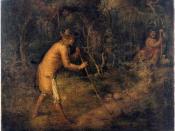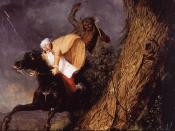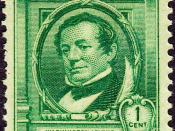Washington Irving has taken a German story passed down from generation to generation, and brought it to American soil by placing its setting during the late 1700's in New England. "The devil and Tom Walker"ÃÂ by Washington Irving contains many unrealistic events, stereotypes, and a few lessons and truths about life.
Throughout the folktale "The Devil and Tom Walker"àthere are many unrealistic events. Most are related to the bargaining between Tom and the devil. This in itself is a extremely unrealistic event. Not to imply that it is not possible to sale your soul to the devil, but meeting him face to face in the form of a burnt man is a highly unlikely event. Along with this incarnation of the devil Tom makes a deal about a line of work that would make him extremely wealthy. Wealth is not unrealistic, but becoming wealthy within "A few days time"æ"à(11) is not very likely even with today's stock market system.
Another unlikely event is when Tom says "The Devil take me if I have made a farthing."ÃÂ (14) and the incarnate shows up at the door with a one way horse ride to the fiery gates of Hell. These events, even though unlikely, are key to the folktale.
Stereotypes are also key in folktales. Washington Irving stereotypes Toms greed by pointing out the condition of his livestock and property. As if this is not enough greed Irving goes on to tell how Tom also cheats the poor out of their money. The character of Satan is also a stereotype. The "Black mans"ÃÂ burnt ashy body and the fact that he lives in the woods, which was in the New England area symbolic of evil, magnifies his wretched personality.
The propose of a folktale is to not only entertain but, give its readers a lesson to walk away with. There are two main lessons in "The Devil and Tom Walker."ÃÂ The main jest of the folktale is what happens to people who are to greedy. Tom, who is so stingy that he won't even feed his own horse pays the price at the end of the folktale by going to hell. This also leads to the second lesson which is be careful what you ask for because you might get it, just as Tom did when he asked for the devil to take him and the "Black man"ÃÂ showed up at this door.
The unrealistic events, many stereotypes and lessons in the "Devil and Tom Walker"ÃÂ makes it a classic folktale. Many things can be learned from a folktale that can even apply to our lives centuries later. Remember always feed your horse and don't make deals with the Devil.





